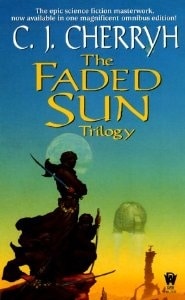The Faded Sun Trilogy by C.J. Cherryh (book review)
Every now and then I take a break from the new releases stacked atop my desk to treat myself to a classic. This time I chose ‘Kesrith’, which begins ‘The Faded Sun Trilogy’ by C.J. Cherryh. I meant to read just one volume, then set the trilogy aside and get on with reading those new releases. Then I meant to read just the second, ‘Shon’Jir’ before getting on with business. Then I had to read the last, ‘Kutath’. I’ll get to the new releases, but first I’d like to share my impression of these amazing books.
‘The Faded Sun Trilogy’ has long been available in one volume and should, in my opinion, be read that way: together, all at once. In essence, it is a book with three parts. The separate novels, ‘Kesrith’, ‘Shon’Jir’ and ‘Kutath’ follow on, one from the other. You could jump into the story at the beginning of each; Cherryh does spare a little thought for the casual reader. But each part or novel builds on the threads of the other. When taken together, the characters and story become more complex and small moments that might otherwise have little meaning become deeply insightful.
So, the story: After forty-three years of galactic war, the regul have ceded the planet Kesrith to humanity and plan to withdraw peaceably. The planet seems barely habitable. Vast deserts, a thin atmosphere, acid rain and an unstable crust. Even the alien regul are forced to live in partially subterranean habitats and the only city is situated on the edge of an alkaline sea. The planet occupies a portion of space that will allow humanity access to unexplored territory, however. It is a gateway.
The regul did not fight their own war. They employed mercenaries known as the mri to battle the humans. The handful of mri still inhabiting Kesrith are thought to be amongst the last. The mri are feared; they are ruthless killers, single-minded in their purpose. Their presence on Kesrith disturbs their employers and the humans. Despite peace with the regul, humanity does not trust the mri to recognise the fact the war is over. The regul share a similar fear. Their shared concern is not unfounded; the mri have lost almost their entire population to a war not their own for a purpose no one quite understands.
Two men, the first humans to arrive on Kesrith, attempt to unravel the shifting lines of mood and politics. Stavros is intent on keeping peace with the regul. His assistant, Duncan, is curious about the mri. Their interests separate them and they are both pulled into a new conflict, one between the regul and the mri, one to each side.
The unravelling of the history of the mri, which they hope will help them forge a future, and the revelation of true face of the regul makes for compelling reading. The story is shared between mri, human and regul points of view and the three species regard unfolding events with startlingly different opinion and purpose. Tall and bipedal, the mri appear less alien than the squat and utterly foreign regul. But their culture is unfathomable. As a reader, I had a hard time grasping it. The regul, while completely alien, seem to understand the culture of exchange; politics, ambition and greed. They almost felt human until they demonstrated quite clearly they were not.
Cherryh does a remarkable job of keeping the three species separate. Her aliens are just so alien. Overlap between sensibilities is slight — enough they can communicate and bargain, forge alliances, but not so much they will ever truly understand one another. This, alone, keeps the tension taut throughout the trilogy. The question of when one character will relent is never answered. They are all strong players and they all have goal they consider important, particularly when the action moves to a far flung star system years from any known civilisation, and decisions they make affect their chances of ever returning ‘home’.
It’s hard to talk about the story as a whole without giving away the stunning shift of priorities toward the end of the first book. Suffice to say, the trilogy covers a journey for all involved; physical and metaphorical. All are seeking something and not all will find it. I came away extremely satisfied by the conclusion. To my mind, just desserts were served, even though I had to overlook the ruin of the dinner table. What kept me flipping pages until that end, however, was the fear things might turn out very, very differently.
Kelly Jensen
June 2013
(pub: DAW. 784 pages paperback. Price: $ 8.09 (US). ISBN: 978-0-88677-869-9
pub: Dutton/Signet edition 784 page paperback. Price: £ 6.77 (UK). ISBN: 978-0-88677-869-9)
check out websites: www.us.penguingroup.com/static/pages/daw/index.htm and www.cherryh.com/





